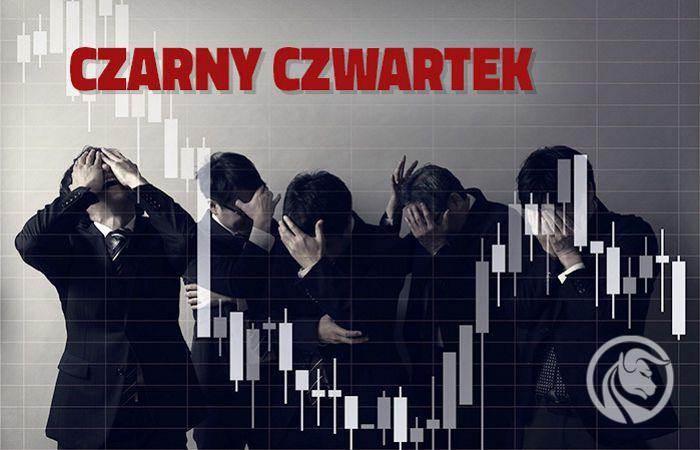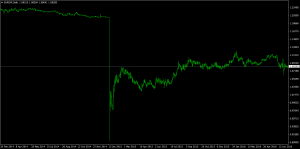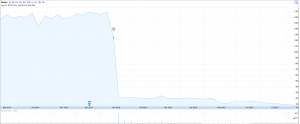How not to lose more than you paid - Black Thursday scars
Black Thursday, January 15, 2015 - 1,5 years have passed since that fateful day that Swiss Central Bank (SNB) decided to unexpectedly free the franc, which caused a huge volatility in the Forex market.
Despite the passage of time, this event is still being talked about and will be talked about. In the financial world, they are on par with Black Friday on Wall Street in 1929, when the "Great Crash" took place. ABOUT black thursday it is said not only because of the shock itself that this decision caused, but also because of what happened with clients' accounts of some brokers, as well as with the brokers themselves. Massive scale of currency fluctuations, the problem of dispersed liquidity, gigantic spreads, trade suspension and position adjustments, and even multi-million debits and bankruptcies. It sounds like a stock ticker Armageddon and in a way it can be interpreted that way. Such a thing happens every dozen or even several dozen years. Anyway, after this event, many people woke up and realized that you can also lose a lot in the financial markets. And sometimes you lose even more than you paid into your investment account. First things first…
Is Forex debit possible?
Of course. No one specifically hides it or rather can not hide it. The supervising institutions require that the client be informed about it, eg by an appropriate clause for the advertising campaign and especially on the broker + site in the contract. The most important is the contract. It regulates the issues that are considering the possibility of a debit and what happens after such a situation. Various scenarios are possible:
- information about the need to repay it (but without giving specific consequences - usually it is just a "bogey"),
- information about the necessity of its repayment and court-bailiff proceedings that may take place in the event that it does not (along with interest accrual),
- a statement that you do not have to regulate it and the debit will be discontinued soon.
What security?
The overdraft can occur in various situations, but usually it is "guilty" siphon. Due to the fact that theoretically, we operate with an amount greater than we actually have, a relatively small movement with a large use of leverage may bring our account balance below zero. These situations occur relatively rarely due to the presence of protective mechanisms such as Margin Call and Stop-Out, but they do not protect us 100%.
READ NECESSARY: What does Margin Call and Stop-Out depend on?
Large leverage, combined with a relatively high volume of position in relation to the account capital, instrument with high amplitude of fluctuations and trade in critical market moments when liquidity is disturbed (eg publication of macro data, important occurrences) and lack of secure position in the form of Stop Loss it's nothing more than asking for trouble. A trader who likes risk and puts forward such a strategy must be aware of the consequences that may occur. It is enough to logically analyze it. If we have a large position and the market has a violent reverse reaction, where most often all of us want to make an identical transaction, which, of course, it becomes impossible. The broker will not carry out our transaction at any price indicated by us, which did not appear on the market but only after the first possible one. The stronger the reaction, the greater the liquidity gap.
Black thursday
In the context of January 15 there was one problem. Few expected such a scenario or rather did not know when the turning point would occur. Therefore, the reaction was even stronger. Lack of liquidity and a strong extension of spreads caused that many orders were realized with a slip on Stop Loss, and in case of its lack, Stop-Out worked. Unfortunately, usually also with slipping. And hence the debits. Admittedly, according to our data, the percentage of people with debits was not large at all, but their accumulated amount in cash was yes.
The scale of the problem is demonstrated by the fact that after that day several companies went bankrupt, including Alpari UK, which had been a brand on the market since 2009, and FXCM, one of the largest retail brokers, was saved by a quick, substantial loan. There were many factors that contributed to this course of events, on both sides. Of course, it can be said that "a wise Pole after the damage", but since it has already happened, it is worth analyzing and drawing conclusions for the future.
Traders' mistakes: Naivety
Naivety consisting in easy earnings. A group of people had the idea that if Price EUR / CHF is protected against a further decline by the SNB, which is to allocate "unlimited" funds for this purpose, it is enough to open a long position and wait for a profit. And here is lesson 1 - there is no easy money on the stock market. Nobody guaranteed anything to anyone and you had to be aware that something unforeseen could happen. Especially that the volume was constantly growing and the average daily volatility on this pair was 15.0 pips.
No security
There is one very old rule when it comes to risk management - "always set a stop loss". There are strategies that assume trading without SL, but it's still worth setting it up. Even somewhere beyond our real reach in the time perspective in which we play. The largest debits were due to the LACK of SL, and not the slippage in its implementation. This means that even if SL did not fully protect us from the overdraft, it could significantly reduce it.
leverage
Large leverage is not risky. The risk is in skilful handling. The use of a leverage greatly increases the chance of a substantial profit, but also a loss. Some investors are not too interested in what this leverage is and what consequences it may have only "how many lots can open on Edek". This is a one-way street leading to the cliff. It can be assumed that the decision of the Polish Financial Supervision Authority to limit leverage from July 2015 was largely dictated by the events of January 15th.
The method of using the entire leverage on the account, where Stop Loss becomes our capital (when paying only a part of the total intended for investments). It cannot be assessed directly whether it is a good / bad technique for earning money, but it certainly increases the risk of an overdraft in an extreme situation. And this must be remembered.
Lack of knowledge of market mechanisms
Surprise and surprise - this is how novice investors reacted to losses greater than they expected. They did not know that in some situations there may be a liquidity problem, which means a problem with closing the position, also by the broker. Suddenly realized that Margin Call and Stop Out they are not a guarantee of no overdraft, but only the last resort, which, in extreme cases, can at most minimize it. We must be aware that when trading on the capital markets our orders (usually 🙂) do not go into a vacuum. There must be another party to buy the value from us.
Ignorance of contracts signed with brokers
Let's be honest - how many of us read all the contracts? I'm betting less than 10%. Incomprehensible language and their length effectively discourage this. There is no denying that these contracts usually protect primarily the interests of the broker. Nevertheless, there is a description of the order execution policy, also in extreme cases, complaint procedures, debt regulation and possible repayment, as well as the possibility of correcting concluded transactions. And we, by signing or accepting a given contract, agree to all of this.
Mistakes on the side of brokers: Offering excessive leverage
Until January 15th, hardly any broker paid any attention to the leverage offered. Usually, clients were offered the largest possible (within reason and the policy adopted by a given company) and no risk was looked at at possible risks with above-average volatility or lack of liquidity. Dukascopy was one of the few brokers to cut leverage ahead of Black Thursday. For pairs with CHF they lowered it to 1:20, similarly to pairs with the ruble before. A larger leverage is also a greater exposure - some, such as Alpari UK, have found out for themselves that this state of affairs is not convenient for anyone.
Brokers learn too. This could be perfectly observed during the last referendum on the so-called BREXIT. When the date of the referendum was known, the brokers did not wait long with information about possible threats. They sent newsletters rapidly (also on platforms), posted information on websites, and some even sent text messages. The leverage has been reduced significantly - the overall level is usually down to 1:50, and on instruments related to Great Britain (GBP pairs, European stock indices) even to 1:20. Mentioned earlier Dukascopy even decided to suspend trading on selected instruments with the highest risk.
Liquidity problems
With such an extreme situation, it was immediately revealed who offers really good-quality liquidity, and who is worse with it. The problem was that without an event of this type it could not be said. The bigger data gap and the larger the spread, the worse this liquidity. This, of course, resulted in customers having their trades closed at lower prices. It is true that the broker was not entirely to blame for all this. Having signed contracts with, for example, 10 liquidity providers, he could not do much when suddenly 8 of them stopped quoting prices. However, this is an immediate hint for him to strengthen this weak link for the future.
Revision of the position
Cases were reported where the broker after 15 January in the next two days revised the transactions of some customers. The revision consisted in a change in the opening / closing price, which resulted, for example, in replacing substantial profits with even greater losses. Of course, everything took place in accordance with the regulations accepted by the client. However, this situation creates a lot of distrust not only for this company but also for the entire industry. The need to revise transactions after such a time shows a huge imperfection on the side of the infrastructure of a given company, which should not happen. Incorrect quotes on the platform are also the reason why a given trader reacted in a certain situation in a different way.
Lack of proper preparation
It was undoubtedly an extreme situation, but you could feel that the brokers are not prepared for such cases. Some suspended trading, others quote but turned off the option of concluding transactions, still others did nothing. Total chaos and disinformation meant that the clients themselves did not know what to do with their positions. And if they couldn't do anything, they didn't know when they could. Until now, it is difficult to say which solution would be the best, but the lack of a transparent response certainly worked to the detriment of both parties.
Healed scars, what's next?
The number of individual cases that have taken place is very large. It is impossible to discuss them all, especially without knowing the details of the brokers (which are somewhat of a secret), so it is impossible to indicate here the culprit, except for one - the Swiss National Bank. The reaction to such a 180-degree change in strategy during the month was obvious and the SNB must have been aware of this. For every other participant in this event, the best thing left to do is to defend themselves in order to get out of it with as little damage as possible. The awareness of investors and brokers has increased, as has risk aversion, and traders themselves began to look for companies offering NBP ...
NBP, or Negative Balance Protection - a way to success?
The abbreviation NBP, although it coincides with the name of our home central bank, does not have much to do with it. This name began to appear more and more on the web after Black Thursday due to the great shadow of fear that that day cast on investors' wallets. NBP, or Negative Balance Protection, is a "mechanism" or rather an element of the offer. It is to guarantee that there is no need to repay the debit in the event of its occurrence on the client's account. In practice, it looks very simple. If, for any reason, the account balance in the client's account drops below zero, the broker will, without any additional conditions, settle it to the balance of 0,00 within the prescribed period.
Among the brokers we work with, at the time of writing the article, few offer such a solution. It is safe to say that it is a niche. With the right financial background and security, such a policy may be right. It will prove beneficial for those trading at the margin of leverage.
READ ALSO: Forex brokers and overdraft protection. List of offers
Are you sure this way?
It is worth asking yourself this question - in connection with Black Thursday, now we should only choose brokers offering the NBP? In my opinion, definitely NO. This is obviously a nice addition that gives us peace of mind. There are not many companies offering NBP and the vast majority of them are located in Cyprus. This may be due to the fact that these companies operate internationally. They are also aware that possibly collecting overdrafts from all over the world would be extremely difficult and expensive. NBP is a good marketing tool, but also an additional cost for the broker that it must cover. If its scale is small, then nothing happened.
But what if there is a massive overdraft wave again? There may be a paradoxical situation where we will make a profit on a given spectacular event. A large proportion of customers will go into overdraft and thus the company will lose liquidity. Needless to say, what was supposed to protect us will prevent us from receiving our profit.
So what broker do we need? First of all, one that puts safety in the foreground. Control of risk and exposure of the client portfolio, access to high-quality liquidity, decent infrastructure (servers, connection with the platform and quotation providers), pro-client policy (no records of a possible position revision at any time), as well as having all the necessary permits and licenses .
Do not forget, however, that we ourselves make investment decisions. Good thinking about them and the proper use of financial leverage and risk management is the starting point to avoid debt.






















![Forex Club – Tax 9 – Settle tax on a foreign broker [Download the Application] Forex Club - Tax 9](https://forexclub.pl/wp-content/uploads/2024/02/Forex-Club-Podatek-9-184x120.jpg?v=1709046278)
![Trading View platform – solutions tailored to the needs of traders [Review] trading view review](https://forexclub.pl/wp-content/uploads/2024/03/trading-view-recenzja-184x120.jpg?v=1709558918)
![How to connect your FP Markets account to the Trading View platform [Guide] fp markets trading view](https://forexclub.pl/wp-content/uploads/2024/02/fp-markets-trading-view-184x120.jpg?v=1708677291)
![How to invest in ChatGPT and AI? Stocks and ETFs [Guide] how to invest in chatgpt and artificial intelligence](https://forexclub.pl/wp-content/uploads/2023/02/jak-inwestowac-w-chatgpt-i-sztuczna-inteligencje-184x120.jpg?v=1676364263)



![Izabela Górecka – “Success on the market depends not only on knowledge, but also on emotional stability” [Interview] Izabela Górecka - interview](https://forexclub.pl/wp-content/uploads/2024/04/Izabela-Gorecka-wywiad-184x120.jpg?v=1713870578)
![WeWork – the anatomy of the collapse of a company valued at $47 billion [WeWork, part II] wework bankruptcy story](https://forexclub.pl/wp-content/uploads/2024/04/wework-bankructwo-historia-184x120.jpg?v=1711729561)
![Adam Neumann – the man who screwed up Softbank [WeWork, part AND] adam neumann wework](https://forexclub.pl/wp-content/uploads/2024/04/adam-neumann-wework-184x120.jpg?v=1711728724)





![The most common mistakes of a beginner trader - Mr Yogi [VIDEO] Scalping - The most common mistakes of a beginner trader - VIDEO](https://forexclub.pl/wp-content/uploads/2024/03/Scalping-Najczestsze-bledy-poczatkujacego-tradera-VIDEO-184x120.jpg?v=1711601376)
![Learning patience: No position is also a position - Mr Yogi [VIDEO] Scalping - Learning patience - No position is also a position - VIDEO](https://forexclub.pl/wp-content/uploads/2024/03/Scalping-Nauka-cierpliwosci-Brak-pozycji-to-tez-pozycja-VIDEO-184x120.jpg?v=1710999249)
![When to exit a position and how to minimize losses - Mr Yogi [VIDEO] Scalping - When to exit a position and how to minimize losses - VIDEO](https://forexclub.pl/wp-content/uploads/2024/03/Scalping-Kiedy-wyjsc-z-pozycji-i-jak-minimalizowac-straty-VIDEO-184x120.jpg?v=1710336731)




















